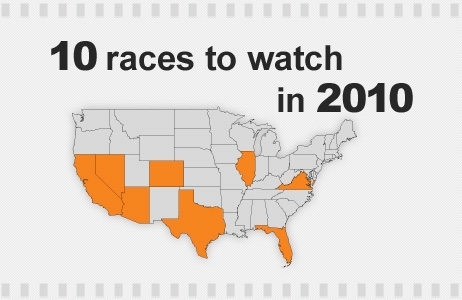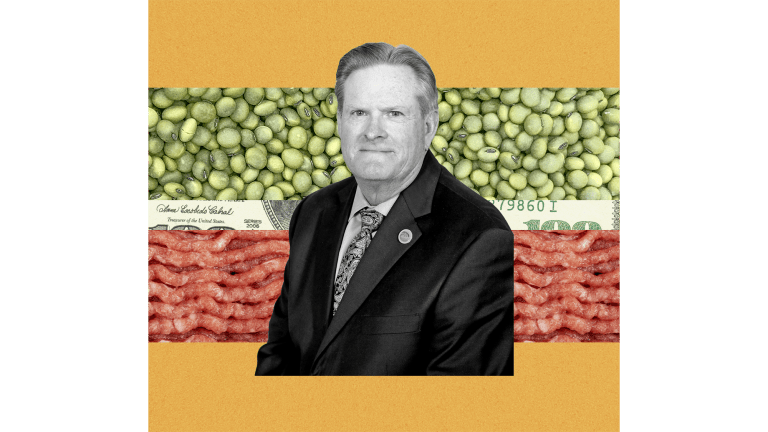California House race, 19th Congressional District
Richard Pombo is back! He antagonized environmentalists as chair of the House Resources Committee (he even removed the word “Natural” from the committee’s name) until 2006, when he got beat by a renewable-energy booster. For his comeback attempt, he’s carpetbagging from the 11th Congressional District, site of his ignominious defeat, to the adjacent 19th, which is more rural and Republican. In the GOP primary, to be held on June 8, he’ll be up against state Sen. Jeff Denham, who has been endorsed by the retiring seat-holder, Republican George Radanovich. Enviros are aghast to see Pombo back in the ring, particularly as a win could return him to his former spot as senior Republican on the (now re-re-named) Natural Resources Committee, where he could resume his agenda of drilling everywhere, selling off national parks, and rolling back the Endangered Species Act. But as the 19th District is deeply conservative and solidly Republican, enviros aren’t likely to get a candidate they’re excited about even if Pombo loses.
Texas governor’s race
Rick Perry, longest-serving governor in Texas history (2000-present), will not be the lone star on the ballot this year; he faces a Republican primary challenge from three-term U.S. Sen. Kay Bailey Hutchison. Neither is beloved of enviros: Perry tried to fast-track new coal plants in Texas and has been skeptical about climate science, and both Perry and Hutchison have criticized the cap-and-trade bill in Congress. Perry, who’s more popular amongst the conservative wing of the party, has been leading in polls, but the March 2 primary will be closely watched. On the Democratic side, former Houston mayor Bill White is likely to get the nomination. White opposed Perry’s plan to push through new coal plants, and successfully pursued a number of green goals while at the helm in Houston, including boosting energy efficiency, upping green building standards, expanding rail transit and bike paths, and buying hybrids for the city’s fleet. White, who served as deputy secretary of energy under President Clinton, appears to be clued in about the dangers of climate change, but prefers to talk instead about growing his state’s clean-energy industries and cleaning up the air — probably a smart approach in Texas. Perry and Hutchinson are both polling ahead of White.
Arizona Senate race
You might think John McCain would be a shoo-in for reelection, but he faces a serious primary challenge on his right flank from former Rep. J. D. Hayworth. Hayworth — Tea Party darling, anti-immigration activist, and until recently host of his own radio talk show — plans to formally announce his candidacy on Feb. 15, but he’s been campaigning and raising money for months. In November, polls showed the two running neck-and-neck, but after McCain announced that Sarah Palin would campaign for him, his numbers shot up; a recent poll showed McCain beating Hayworth 53 to 31. McCain sponsored the first major climate bill in the Senate in 2003 and similar bills in later years, and he pushed a cap-and-trade plan of his own while running for president in 2008, but since losing to Obama, he’s been bashing climate legislation using stock Republican talking points about “cap-and-tax” leading to “a government slush fund.” If a climate bill comes up for a vote in the Senate before Arizona’s Aug. 24 primary, McCain may vote against it to protect himself from Hayworth, who’s criticized the senator for supporting cap-and-trade. If a vote comes after the primary, McCain may be more inclined to support bipartisan climate legislation. No matter who wins the primary, this seat is expected to remain in the GOP column.
Colorado governor’s race
Pending probable primary wins on Aug. 10, Denver mayor and former brewmaster John Hickenlooper (D) will face off against former Rep. Scott McInnis (R) to replace retiring Gov. Bill Ritter (D). Hickenlooper has stressed the importance of cities taking action against climate change, and has done a lot to green his own city, including expanding its “Green Fleet” program, extending light rail, and developing new green building standards. Under his leadership, Denver was named by NRDC as one of the most sustainable cities in the U.S. McInnis, who earned a 10 percent score from the League of Conservation Voters for his last term in Congress, wants to loosen the state’s oil and gas regulations and last year criticized Ritter for “adopting the radical leftist [environmental] positions” of Robert Redford. This should prove to be a “rocky” race: the latest poll shows Hickenlooper just slightly in the lead.
Florida Senate race
The race for Florida’s open Senate seat may come down to the Republican primary on Aug. 24, as the likely Democratic candidate, Rep. Kendrick Meek, is trailing the two Republican hopefuls by double digits. The main GOP contenders are Gov. Charlie Crist and former state House speaker Marco Rubio. Crist, a moderate with a record of protecting the environment and fighting climate change, has been toning down his green rhetoric as he does battle with Rubio, a conservative who has the backing of many Tea Partiers. Enviros say Rubio has flip-flopped on cap-and-trade, but he claims he’s always been opposed. In December, Rubio said there’s “a significant scientific dispute” over whether climate change is human-caused. In August 2009, Crist had a lead of 30 points in the polls, but now Rubio is up by 12 points. Can a moderate, greenish Republican beat back a Tea Party icon? The whole country will be watching the Sunshine State to find out.
California governor’s race
With Arnold Schwarzenegger term-limited out of office, more than 16 candidates are vying to replace him in a race that’s considered a toss-up. Front-runners include former governor and current attorney general Jerry Brown (D), former eBay CEO Meg Whitman (R), and state Insurance Commissioner Steve Poizner (R), though U.S. Sen. Dianne Feinstein (D) could certainly stir things up if she decides to enter the race: she is polling almost even with Brown, and ahead of the Republicans, even though she hasn’t declared her candidacy. Whitman has said that her first move as governor would be to freeze implementation of California’s landmark climate law, AB 32, and Poizner wants to do it too. Brown, in contrast, wants vigorous enforcement of the state’s climate law; as attorney general, he’s aggressively pushed for environmental protection and fought the feds for California’s right to regulate tailpipe emissions. Feinstein also has a strong green record, consistently earning high scores from the League of Conservation Voters. The June 8 primary will determine who heads into the general election.
Virginia House race, 5th Congressional District
Rep. Tom Perriello barely won his seat in 2008 — and he has no Obama coattails to ride on in 2010. He was considered a fence-sitter on the Waxman-Markey climate and energy bill in the House last summer, but he ultimately voted for it — despite being the target of fake letters purported to come from groups in his district that opposed the bill. In his 2008 campaign, Perriello called for expanding offshore drilling, but also for ending federal subsidies to oil companies and investing in clean energy. This year, he’s been endorsed by the League of Conservation Voters Action Fund. To win again in his conservative district, he’ll have to put up quite a fight — but GOP infighting is giving him a boost already. The Republican Party is backing moderate state Sen. Robert Hurt, while Tea Party activists, enraged at Hurt’s earlier support for tax increases, have promised to run a third-party candidate if he wins the nomination in the June 8 primary. To further complicate matters, former Rep. Virgil Goode, Jr., whom Perriello beat by just 727 votes in 2008, is “lurking on the sidelines,” considering a possible run as an independent. Perriello is one of several Democrats from swing states who are trying to explain (or, in some cases, run away from) their votes on the Waxman-Markey bill; they’d be in more trouble if Republicans weren’t busy beating each other up over “purity.”
Read a Grist interview with Perriello.
Nevada Senate race
Odds aren’t looking good for Senate Majority Leader Harry Reid, who will seek a fifth term this November. His favorability rating has dropped to 33 percent, and when put up against his Republican challengers, he has lost in almost every poll taken since last July. Reid hasn’t always been beloved of enviros — he’s a big backer of the mining industry, for one — but he’s gotten props for working to push through a climate and energy bill over the past year, and the League of Conservation Voters Action Fund is backing his campaign this year. As for his top two GOP competitors, who will duke it out in a June 8 primary, Sue Lowden says a cap-and-trade system would “permanently cripple our economy, kill jobs and force businesses to move out of our country for good,” while Danny Tarkanian has yet to make clear his position on climate and energy legislation.
Illinois Senate seat
Aiming to recover from a politically scandalous couple of years (well, really, couple of decades), Illinois is finally ready to fill the Senate seat left vacant by Barack Obama–this time, by vote! The state’s Feb. 2 primary determined the contenders: Democrat Alexi Giannoulias and Republican Mark Kirk. Giannoulias, the state treasurer, calls for “a comprehensive, market-based system that puts a price on global warming pollution and spurs investment in renewable energy and new clean energy jobs”; he’s been endorsed by the League of Conservation Voters Action Fund and the Illinois Sierra Club. Kirk, who has served in the U.S. House since 2001, was one of just eight Republicans to vote in favor of the Waxman-Markey climate and energy bill last summer, but after being attacked by Tea Partiers, he switched positions and now says he’s opposed to cap-and-trade.
California Senate race
Barbara Boxer, three-term senator and co-author of the now inert Kerry-Boxer climate and energy bill, is struggling to maintain a narrow lead over three Republican challengers — former Hewlett-Packard CEO Carly Fiorina, state Assemblyman Chuck DeVore, and former Rep. Tom Campbell. Boxer, who chairs the Environment and Public Works Committee, has long been an outspoken advocate for the environment, working to block oil drilling in the Arctic National Wildlife Refuge, protect wilderness, and promote clean energy and climate action. In contrast, Fiorina has pushed for offshore drilling and pussyfooted around whether climate change is a real problem, while DeVore has bashed cap-and-trade as a job-killing scheme. Campbell, for his part, has said he believes California’s landmark climate law, AB 32, can be implemented without harming the state’s economy, though he believes it should be done through a carbon tax rather than a cap-and-trade system. A June 8 primary will determine who wins the Republican nomination. In a normal election year, Boxer might be considered safe for reelection, but this year she knows she’ll have to fight hard to fend off GOP competition.



